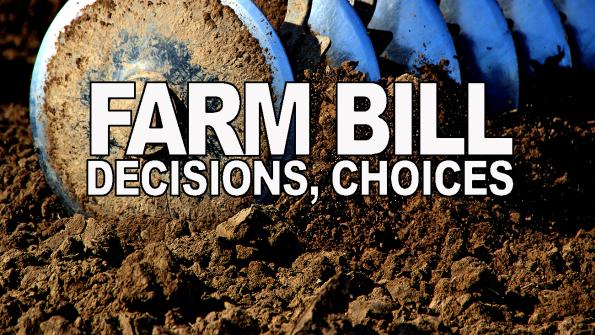
Editor's note: Bobby Coats is a professor in the University of Arkansas Division of Agriculture.
The timeline to update yield history or reallocate base acres and elect ARC or PLC coverage ends March 31.
Timeline to elect ARC or PLC coverage
• September 29, 2014, until March 31, 2015 – Update yields & reallocate base acres
• November 17, 2014, until March 31, 2015 – One-time election of either ARC or PLC for 2014 through 2018 crop years
• Mid-April 2015 through Summer 2015 – Contract enrollment for 2014 & 2015 crop years

What actions need to be completed as soon as possible at my area FSA office?
Farm by farm and crop by crop – March 31, 2015, deadline
• Verify the correctness of countercyclical yield, base acres, 2009 to 2012 planted and prevented planted acres, etc., and provide required yield data for years 2008 to 2012.
• Retain or update yields (one should update yields if updated yield is higher than the old countercyclical yield).
• Retain or Reallocate base acres. This decision can be simplistic or challenging.
• There is a one-time opportunity to elect either ARC or PLC (farm by farm and crop by crop) for 2014 through 2018 crop years.
If no changes are made to yield history or base acres by March 31, 2015, what happens?
If no changes are made to yield history or base acres by March 31, 2015, the farm’s current yield and base will be used.
If no program choice, ARC or PLC, is made by March 31, 2015, what happens?
A program choice of ARC or PLC coverage must be made by March 31, 2015, or there will be no 2014 payments for the farm and the farm will default to PLC coverage through the 2018 crop year.
INFORMATION ON TWO UPCOMING WEBINARS
Is cotton a covered commodity?
No, cotton is not a covered commodity.
Covered commodities include barley, canola, large and small chickpeas, corn, crambe, flaxseed, grain sorghum, lentils, mustard seed, oats, peanuts, dry peas, rapeseed, long grain rice, medium grain rice (which includes short grain rice), safflower seed, sesame, soybeans, sunflower seed and wheat. Upland cotton is no longer a covered commodity.
What is the best approach for making the yield, base and ARC or PLC election decision?
For southern producers I would recommend using the Texas A&M and Missouri FAPRI Web-Based Farm Bill Decision Aid along with one’s farm data, assumptions and future expectations.
If I do not plan to use the previously discussed web-based farm bill decision aid do you have a suggestion?
One option is to use the Texas A&M and Missouri FAPRI ARC/PLC Evaluator for Generic (Cotton) Base Module or Decision Tool. This tool compares expected PLC and ARC-CO payments (the average payment across many possible future realizations of prices and yields) for a county of your choice. In the calculations, they use two key assumptions. First, they assume that you would have a PLC Payment Yield equal to the default value assigned by FSA in the absence of a yield history. Second, they assume expected prices equal to the latest FAPRI projections.
The output reflects only expected payments for PLC and ARC-CO. It should be noted, that choosing ARC-CO precludes one from purchasing the crop insurance Supplemental Coverage Option (SCO). Expected net SCO indemnities are not reflected in the output.
We will be covering this discussion aid module and updated presentation in more detail in coming articles and our March 26 webinar.
New webinars:
Bobby Coats, Professor, University of Arkansas Division of Agriculture; Tony Franco - Chief, Farm Programs Division, Arkansas State FSA Office and Anita Wilson - Agricultural Program Specialists, Farm Programs Division, Arkansas State FSA Office continue their series of Farm Bill webinars.
Individuals wishing to participate in the webinars must register for each session separately. The webinars are conducted through a software program called Zoom. Upon registration, users will receive an email confirmation with the link to join the webinar and the system requirements for Zoom.
Generally about 8:40 a.m., Tony Franco, Anita Wilson and I will start answering any farm bill related questions before the 9 a.m. presentation begins.
March 26, 2015: Comparing PLC and ARC-CO Options with Bobby Coats, Professor – University of Arkansas Division of Agriculture, Department of Agricultural Economics and Agribusiness and Tony Franco, Arkansas FSA - Chief of Farm Programs and Anita Wilson Arkansas FSA - Agricultural Program Specialist will be on hand to answer farm bill questions. Registration Link for March 26: https://uaex.zoom.us/webinar/register/1fee84eed18552b57510d14dfea9e911
April 1, 2015: Results and Review of the 2015 March Planting Intentions and Stocks Reports, Eugene Young
Deputy Director, USDA-NASS, Delta Regional Office. Registration Link for April 1: https://uaex.zoom.us/webinar/register/26db47dc4e93e018c5b9141539e44ee6
2 critical Decision Aid webinars worth viewing
• Decision Aid Training: 2014 Farm Bill Decision Aid Training with Professor James Richardson, Agricultural and Food Policy Center (AFPC) - Texas A&M University Webinar Video and Power Point PDF
• The Crop Market Outlook & Farm Bill Choices: Professor Pat Westoff, Director of the Food and Agricultural Policy Research Institute (FAPRI) at the University of Missouri-Columbia Presentation Video and Power Point PDF
About the Author(s)
You May Also Like




